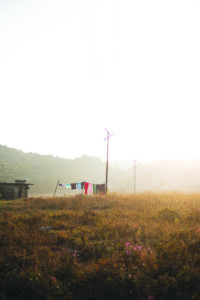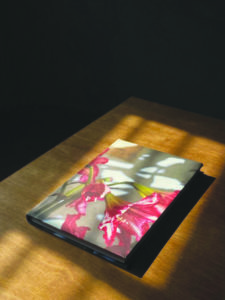By Christina Taipodia
Through all the years of Anurag Banerjee’s frequent journeys to and from Shillong, he realised how he had become a visitor in his own home, unaware of the fact that his experiences would go on to influence his work.
 “Perhaps home is not a place but simply an irrevocable condition” Baldwin’s words introduce the theme of Anurag Banerjee’s photo book, I’m not here.
“Perhaps home is not a place but simply an irrevocable condition” Baldwin’s words introduce the theme of Anurag Banerjee’s photo book, I’m not here.
In a unique presentation of images and text, I’m not here explores the idea of home and how he asserts his belongingness in the city of Shillong. For Anurag, the interplay of the visual medium with the literary, further evokes a sensory trigger to what the photographs already try to convey; feelings of nostalgia. He says his writings exist along with the photographs because it serves as a passage to hold the story together. As he addresses the concept of home, his art reflects his relationship with his family, his dog Snowy, and memories of Shillong.
“The idea of home is who we are and what shapes us,” he says.
Born and raised in Shillong, Anurag’s interest in photography began when he moved out of his hometown to pursue a Media Studies course in Pune. After he finished his studies, he started introducing himself as an independent photographer based in Bombay, from Shillong. The mention of his hometown made an impression on how it has an impact on his love for photography and his identity.
At an early stage in his college life, his father bought him his first camera. Coincidently, it was the same day he picked up a photography magazine and found himself deeply moved by Prabuddha Dasgupta’s work. “If this is what you can do with a camera, then this is what I am going to do.”
He was also drawn to American photographer Sally Mann, who is known for her personal work. On a usual rainy day at home, he sat in his bedroom and watched the rain fall from his tin roof. The light from the window shone on the wooden floor while his dog, Snowy slept cozily next to him. The ambience of that particular day brought out the intention to do what he does today as reflected in his photo book. It was in the feeling of closeness and attachment he felt at that moment, as it radiated Sally’s words of photographing what is closest to you.
 He was convinced, and dedicated towards his goal. “Photography just happened to me,” he explained, “I picked up the camera to tell my own story.”
He was convinced, and dedicated towards his goal. “Photography just happened to me,” he explained, “I picked up the camera to tell my own story.”
Anurag’s first acclaimed work, Love in Bombay, documents intimacy in public spaces and was born out of his fascination for the city. The images from the series look as though the city was staged just for him to capture. It is, however, a style of work he decided to move away from as it rendered ethical and moral questions surrounding photography, which he has yet to resolve.
Regardless, this endeavour was what eventually brought him closer to create something that was a reflection of who he is. “Moving away brought me closer to Shillong,” he says. “I wanted my first work to talk about who I am.”, he mentioned.
As he reminisced about his days in Shillong, he said, “In the chaos of Bombay, you tend to lose your mind sometimes. That is the time when I would shut my eyes, and think of the landscape, the light, the cool breeze, and hold on to a feeling which gave me comfort to go on with my life in Bombay.”
In 2019, he handmade 50 copies of I’m not here and distributed them for free. It is where he figured the core of the work with his photographer and photo book maker friend Gareth Phillips, who observed his project was not just about his memories of home, but a universal idea of home.
“And that is why I begin the book with Baldwin’s words: Perhaps home is not a place, but an irrevocable condition, because it really is.” Over the span of eight years that went into producing the work, he believes his book has evolved just as he has, with a new sense of meaning and maturity.
 At the end of 2019, when the citizenship movement gained momentum in Shillong and Assam, Anurag questioned his role as a photographer and the movement made him confront his identity like never before. “It was only then that I realised I needed to educate myself and gain a better understanding of the community that I call home,” he continued. With that in mind, he arrived in Shillong in August of 2020. “Locals of Shillong were voicing their worries of becoming minorities in their own land, and we need not be hostile in this situation. I wanted to extend my support by saying, yes, I understand where you are coming from, I am not a native of this place, but this is also where I am from. This is also the home that I know.”
At the end of 2019, when the citizenship movement gained momentum in Shillong and Assam, Anurag questioned his role as a photographer and the movement made him confront his identity like never before. “It was only then that I realised I needed to educate myself and gain a better understanding of the community that I call home,” he continued. With that in mind, he arrived in Shillong in August of 2020. “Locals of Shillong were voicing their worries of becoming minorities in their own land, and we need not be hostile in this situation. I wanted to extend my support by saying, yes, I understand where you are coming from, I am not a native of this place, but this is also where I am from. This is also the home that I know.”
Recalling another one of Baldwin’s quotes he says, “You cannot stop living your life, but you have to make life liveable for the next generation”.
“I would like to think of life on earth as a relay race where the baton is passed from generation to generation, and right now it is with us, so how do we pass it on to the next? This thought keeps me going,” he concluded.
How do we assert our belongingness in a place that is not entirely ours, yet it is the only home we know? If home is a feeling, Anurag’s work has a way of making you feel homesick.
And if home is a place, Shillong has a way of making you feel at home, where you keep visiting, and always come back to.
I’m not here extends this feeling, making you experience it all over again. Through a series of timeless images in the photobook, Anurag tries to claim his home, which presents itself as a love letter to Shillong. He has intended the photobook to have a gift-wrap feel, with a book that would wear and tear over time.
Anurag Banerjee has been published in The Caravan, The Indian Quarterly, The Hindu, among others. He is currently working on his second body of work which will reflect his experiences of Bombay, a place where he also considers home.
Anurag will hold his debut launch of the photobook I’m not here, in conversation with author Janice Pariat, in Dylans Café Shillong on June 3.



